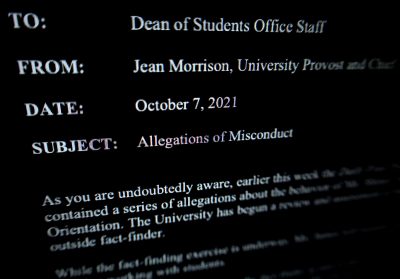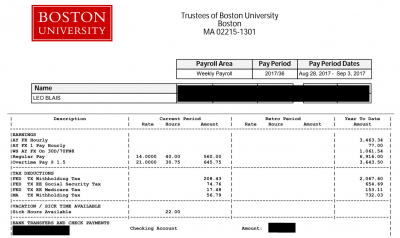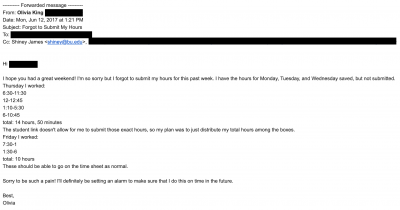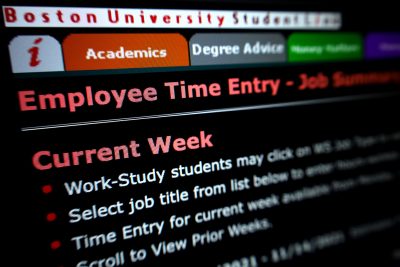By Cameron Morsberger and Colbi Edmonds
Multiple students who worked at Boston University Orientation allege that senior Orientation staff instructed them to misreport their hours to comply with Massachusetts labor laws.

Per those laws, BU students working on-campus jobs cannot work more than six consecutive hours without a minimum 30-minute, unpaid break. And during official University breaks, including summer recess, students cannot work more than 40 hours a week.
Students claim they reported false break times at the behest of Orientation leaders, worked far more than 40 hours a week — up to 80, at times — were underpaid for the hours they worked and had their hours suddenly cut and portions of their pay withheld.
The University launched an investigation into Shiney James, director of BU Orientation, due to allegations brought forth in an article The Daily Free Press published last month, in which students allege James was verbally abusive. The article has since garnered hundreds of responses from former Orientation staffers who further confirmed the reports.
Since early October, James has been reassigned duties and does not currently work with students, according to a letter from Provost and Chief Academic Officer Jean Morrison to the Dean of Students Office staff. James’ name was recently removed from the Orientation staff page.
James did not respond to multiple requests for comment, and the University’s external fact-finder, Amy Serino, declined to comment. University spokesperson Colin Riley also declined to comment, citing the investigation.
Overworked and underpaid: students instructed to forge timesheets
Former Orientation student employees claim Orientation senior staff members instructed them to log their hours inaccurately because they did not receive proper break times or because they worked more than 40 hours in a week, the legal limit.
Students working for the University record their hours via the Student Link’s Employee Time Entry, which former employees said does not accept timesheets that do not include a break every six hours. Because of state labor laws, as well as the limitations of the Student Link portal, students allege they were told to add nonexistent breaks to their shifts and make up for the rest of their hours by reporting them at different times.
Leo Blais, who graduated from the College of Fine Arts in 2017, worked as a student advisor in 2015 and a coordinator of programs — known colloquially as a CoP — in 2017. Being an SA involved leading groups of incoming students and introducing them to campus, Blais said, and he worked largely on organizational, preparatory planning for Orientation sessions once he became a CoP.
Because Orientation staffers did not receive breaks at appropriate times, Blais said they had to inaccurately report their hours.
“You couldn’t really put in your hours truthfully because the system would say, ‘No, if you worked more than eight hours today, it’s impossible that you worked more than six hours straight, you must have made a mistake,’” Blais said. “You were never really getting breaks at the right time.”
Blais said he and other CoPs would make a 30-page “Respos” document, containing the hourly responsibilities of Orientation student staff for each day of an Orientation session. Due to the nature of Orientation, during which student advisors would work for about 40 hours in the span of about three days, Blais said he became used to the “grueling” time commitment.
While he could not receive overtime pay as an SA, Blais said he earned time and a half while working as a CoP, often amounting to more than 30 hours in overtime alone.

Despite efforts to plan adequate breaks for other student employees, Blais claims the CoPs did not have scheduled breaks and often stayed in the office well past 9 p.m. drafting the next session’s Respos guide.
“The couple weeks leading up to the first session, we definitely would stay in the office pretty late,” Blais said. “When people had wake-up duty, say a little earlier, and then if they had the last lunch break, they definitely worked probably longer than what is legally required.”
Eight other former Orientation leaders confirmed to The Daily Free Press they were told to change their hours to log breaks that had never taken place.
Olivia King, a 2018 School of Education alum, was a program advisor at Orientation in 2017, where she communicated with parents as part of BU Orientation’s Siblings Program: families of matriculating students can sign their other younger children up for BU-sponsored activities.
King said she would sometimes work 15-hour days but was generally content with her hours. When inputting her timesheets, however, King said she noticed she lost an hour or two of pay on multiple occasions.

Initially, King said she thought she had inputted break times incorrectly because she and other staff “never took breaks.”
“That first week or two of Orientation, one of the CoPs would come find you for your break, but then after that, you never got your break,” King said. “You didn’t want to tell someone you didn’t have it because you were scared [James] would yell at you or you’d be late to your next responsibility, so it just wasn’t worth it.”
Students occasionally were assigned early morning hours on especially long work days, which Blais said he sometimes considered “retributive scheduling,” meaning James or other Orientation staff allegedly gave certain students worse hours as a form of punishment.
As a 2018 FYSOP coordinator for Orientation, Paige Hill — who graduated from the College of Communication in 2019 — met with parents and students and led group discussions during Orientation sessions.
Hill said she felt “brainwashed” by the experience as part of summer staff and ended up “basically just working all the time,” often well beyond her designated hours each day. She does not recall ever getting adequate break time.
“That whole summer is kind of a blur because I think I just was so exhausted,” Hill said. “I think knowing what I know now, absolutely I would have been like ‘I need a break to exist and be a student employee.’”
For some students, Orientation is their first job and an opportunity to live in Boston for free, Hill said, meaning those who needed the position chose not to complain about their lack of breaks or falsified timesheets and simply endured the working conditions.
“I really think BU abuses students who are like, ‘This seems like an awesome job I can put on my resume, and I get free housing, and I get to stay in Boston for the summer,” Hill said. “And then it’s working way beyond anything that’s healthy or appropriate.”
‘I really needed every dollar’: students’ hours cut, portion of paycheck withheld
Former Orientation staff — who were not CoPs — say they were expecting to work a full-time position, but many students claim they were underpaid or assigned fewer than the 35 to 40 hours a week they anticipated.
Zoe Plzak, a junior in the College of Arts and Sciences, was a CAS student facilitator in 2020 when Orientation was held entirely online. Before she started, Plzak said she anticipated working 35 hours a week and her supervisors advised her not to get a second job because of the time commitment.
However, she said she ended up with only 17 hours’ worth of pay per week, prompting her to get two other jobs that summer. In an email obtained by The Daily Free Press, James directed students to “write a formal request” before seeking a second job on campus.
Orientation senior staff blamed the shortened hours on the pandemic, Plzak said, but even when she reported 19 hours on her timesheet, her paycheck would still be cut unexpectedly.
“I started taking screenshots of my Zoom screen whenever I entered and left as justification for what my timesheets were logging,” Plzak said. “Once they paid me that extra time, there [weren’t] enough sessions left of the summer to really prove anything.”
After noticing her approved hours repeatedly did not match her recorded ones, Plzak said she met with a senior staffer, who claimed Plzak had taken breaks and was therefore docked an hour. Plzak said the senior staffer cited that 15-minute intervals would be taken out of employees’ pay.
Plzak learned during the meeting that, while she remained in a Zoom breakout room between activities and was not talking to students, she was on an unpaid break.
“They considered that a break and that I didn’t work because I wasn’t speaking to students and took that off my timesheet,” she said. “I said ‘That breaks federal labor laws. You cannot deduct time for a break that’s less than 30 minutes,’… the next week, I was given an extra hour and a half worth of time, and nobody ever mentioned it to me again.”
Federal law considers any break under 20 minutes as a part of paid working hours, according to the U.S. Department of Labor. Longer breaks, of 30 minutes or more, are not federally required to be paid for.
Natalie Gonzalez, a senior in CAS and student advisor at Orientation 2019, said certain students experienced similar punishments, including wake-up duty, when some SAs got up 45 minutes earlier than usual to knock on the doors of matriculating students at the beginning of the day.
Early mornings, combined with late-night check-ins — when SAs made sure students returned to the dorms safely — meant Gonzalez and others got little to no sleep.
“We were up until 3:30 in the morning, and I had to get up at 5 to work again the next day, so I was working 24 hours,” Gonzalez said. “That should have been well over 40 hours that I actually worked. I think I probably got paid 32.”

One former student advisor, who requested anonymity, said part of their paycheck was withheld.
At the time, students were supposed to receive $400 per Orientation session and an additional $400 if they performed in a skit. However, during this person’s time as a student advisor, the pay scale changed from a stipend to an hourly rate. After that switch, the student asked James if they would still earn $400 for the skit, which they said James confirmed, but they ended up receiving only $261.
“I was on a big financial aid grant at BU so, at the time, I really needed every dollar that I was getting from my summer job,” they said. “I was really affected.”
The student contacted former Associate Dean of Students Jack Weldon via email, which was verified by The Daily Free Press, outlining their situation and explaining that James told students multiple times she would “‘not screw [them]’” with their pay.
“When we met, she told me I would not be receiving the money because it was not listed in my contract and because I made enough from training to make up for it,” the student wrote in a 2015 email to Weldon. “When I reminded her about one of the times (listed above) where she guaranteed me and the other student advisors a full $400, she said that it was not in writing and did not matter.”
The student said they forwarded their emails to the University-hired fact-finder.
Weldon directed the issue to Associate Dean of Students and Shared Business Services Steve Singer, who called the student and helped them receive the rest of their payment. Neither Singer nor Weldon responded to requests for comment.
The student said Orientation student employees’ paychecks were “regularly” reduced from the hours they worked, and students were “almost never” given full breaks. Additionally, during a lot of the sessions their summer, they said employees were advised on what hours to log in to the Student Link — even if they worked 50, they were told to input 40.
“It was made clear to us that those breaks are just not available most of the time, but it was something that the record needed to be captured to make it look like we were doing it,” they said. “Shiney was usually the one making it clear to us that that’s how it had to be done.”
Complaints left unresolved, disregarded
Former Orientation leaders notified BU administration about James’ allegedly abusive behavior and contacted James herself regarding Orientation’s break schedule years ago, but they said they received little to no response.
Amanda Álvarez, a 2016 COM alum, worked at Orientation during the summer of 2014 as a program advisor — a role in which she answered phone calls, set up events and completed other office-related tasks. Álvarez said she spoke with Serino, the University-hired fact-finder, about her experiences.
Álvarez said she was also told to fabricate breaks in her timesheet and yet was once berated for taking a lunch break. James allegedly called Álvarez a liar and asked if her mother “raised [her] to be that way” after letting James know she was having issues with housing, Álvarez said. Additionally, Álvarez recalled that James once passed out plastic googly eyes to student employees as a reminder that “she had eyes and ears all over the city.”
“In that moment, it was really scary. Being first-gen, most of my tuition being paid by financial aid,” she said. “[I felt like] I couldn’t say anything because I didn’t want anything to ruin my chances at BU.”
Álvarez said she spoke with Assistant Dean of Students David Zamojski in October of 2014 about her experience with James, which she described as “a summer’s worth of abuse.” Álvarez said Zamojski just nodded during the meeting, and there was no update after the fact.
Zamojski declined to comment, citing the current investigation.
“I think something that was really helpful was having other program advisors,” Álvarez said. “It’s just one of those things where it’s like ‘This happened. It’s not just me. It’s not just in my head.’”
Eli Brenna, also a 2014 program advisor and videographer, emailed James in July of that year about a new break system she had proposed. He wrote in his email, which was obtained by The Daily Free Press, his concerns with implementing the new break schedule James had instituted after students allegedly told higher-ups about not receiving state-mandated breaks.
James created a “backwards approach” to fix the issues concerning breaks, he said, which involved students starting work at 5:30 a.m. on Thursdays. James responded to his email, writing, “Thanks for your input. We will do what is best for our students and parents.”
“It was an overwhelming amount [of work] for everybody,” Brenna said.
Brenna also emailed Dean of Students Kenneth Elmore — who declined to comment, citing the ongoing investigation — and Zamojski in May 2015, about a year after his employment, regarding his experience with James.
Brenna said he spoke with Zamojski, who told him James’ behavior would be addressed. But Brenna said no actions were taken.
“Looking back, I maybe should have known from the way people were talking about it that it was not going to be this idyllic thing,” he said. “But at the time I guess I didn’t really know better.”
Brenna said there are “significant parallels” between James’ direction of Orientation and different cultic behaviors, which he described as love bombing and manipulation — a “well-honed routine” formed over the nearly 15 years James has run Orientation.
“Just because there are people out there who still support Shiney, that doesn’t invalidate the bad experiences other people had,” he said. “It’d be surprising if a cultic situation like this didn’t convert people.”
As the University continues to investigate James’ behavior, a former student Orientation leader, who requested anonymity due to fear of retribution, said they believe BU administration has known about Orientation’s alleged dysfunction for a while but chooses to protect James from facing any repercussions.
“It’s almost like this weird sisterhood, obviously they’re close together, they worked together for years and years and years, but I think that they’ve almost got a pact between all of them,” the student said. “No one’s going down because of them.”



















































































































Anonymous Former Student • Nov 20, 2021 at 2:14 pm
As a former BU student, this validates my hatred of BU. It’s made up of people who’ve gotten fat and comfortable under the folds and protection of this toxic bureaucracy (nicknamed “BU-reaucracy”). They don’t care about hurting students because they hold power and know that some students—usually of POC/first-gen college/immigrant/poorer backgrounds—won’t speak up for fear of retribution or due to feeling powerless.
Adrienne Suter BU 2013, Orientation 2011 • Nov 12, 2021 at 12:28 pm
My siblings forwarded me this article–everyone in my family is now invested in this “ongoing investigation.” Two weeks ago, I spoke with the fact finder about my experience at BU Orientation in Summer 2011. I keep waiting for something to happen–anything–we’re all just in “sit and wait” mode.
Phenomenal reporting. Who could have imagined that people who were 10 years old when I was going through Summer 2011 would later become the people to lead the charge of justice a decade later? Very cool. Go Gen Z!
Gloria Edmonds • Nov 9, 2021 at 1:58 pm
A conviction of forgery and falsifying documents in the state of Massachusetts can result in punishment of imprisonment in the state prison for up to ten years or a jail or house of correction sentence of up to two years.
Nice reporting, and following up ladies. Usually when they say “looking into,” it is code for nothing is happening to Shinney right now.
There should have been an immediate resignation and apology sent out for the appalling behavior of someone who is a Position of power at such a prestigious University.
Who is protecting this woman? If it is a group holding each other up just know your ship is sinking.
Do better BU.
Concerned Student #927363 • Nov 9, 2021 at 1:17 pm
Incredible reporting once again from Freep. These reporters will go far. I’m hoping that the BU administration takes this as a cue to do some self-reflection and make some changes. Otherwise, I see this story turning into a compelling movie on the Starz network.
Anonymous • Nov 9, 2021 at 10:58 am
Amazing reporting once again. Thank you FREEP for the continued investigation into this, and thank you to the brave students coming forward with their experiences. As a 2016 orientation employee myself, I remember being instructed on how to input my hours so they fit the university’s protocol, when in fact it was a lie and we never got the required breaks. This program needs a complete overhaul.
Anonymous BU Staff • Nov 9, 2021 at 10:34 am
I have a question. Why is Shiney still currently working at BU? They took her away from the students she was abusing, but she should most definitely be put on unpaid/paid leave while the investigation is active. Why is the University continuing to compensate someone who has “allegedly” (clearly) caused harm to so many?
Anon staff • Nov 9, 2021 at 11:52 am
I keep asking myself that same question. It’s probably that SJ still has someone in the administration protecting and defending her, and that the administration as a whole were hoping it would all blow over before students and their families start suing. The fact-finding investigation conveniently prevents anybody who knows anything from commenting and can BU cover that they are supposedly doing something while acting like their hands are tied before all the “facts” come in. It’s telling that instead of believing the students they put forth this delaying tactic.
Anonymous • Nov 23, 2021 at 1:39 pm
Having worked at a few universities in the past, including BU, I can guess it’s probably bureaucracy that’s delaying the process – as boring as that sounds. They need to have a “formal” investigation, and given that some of the allegations date back for years and years, it’s going to take some time, and involve many offices. I don’t know if BU has a “leave without pay” policy but it’s pretty uncommon for universities to provide that in a circumstance such as this . AND because this is such a public thing now, the university is probably being guided by a legal team and having to balance her rights as an employee, too. It is a massive delay, but it’s not so much a tactic as it is a symptom of the university structure overall. They’re not built for accountability + justice.